Max
Payne Returns
This
week returns an older and wiser Max Payne, who was the star of Remedy
Entertainment's 2001 third-person action game. In that game, Max took
on the role of a one-man army in a quest to avenge the murder of his
family, and he mowed through armies of mobsters and thugs, armed both
with a huge arsenal of modern-day firearms and with bullet time, a
dramatic special effect inspired by Hong Kong action movies that let
Max briefly slow time and actually dodge oncoming bullets. Max was
finally apprehended by the police, but not before he finished off
the last of the thugs who had wronged him.
The
weary cop was ready for a death sentence of his own, but at the beginning
of the sequel, we find that he is instead exonerated with the help
of the very influential Alfred Woden, who makes Max seem like a hero
in the public eye. In true film-noir fashion, Max is haunted by demons
of the past and abandons his highfalutin job at the DEA in favour
of a regular NYPD beat.
We
caught up with Max on what seemed to be a routine distress call--the
sound of a woman screa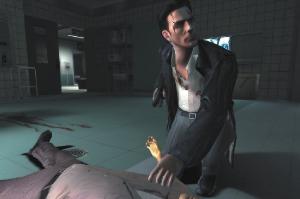 ming
for help in a warehouse. As Max pulled up in his patrol car in an
in-engine cinematic sequence, he heard shots fired and called for
backup on his police radio, then readied his gun. Before heading in
with Max, we took a brief stroll around the perimeter of the building,
which was lit at each corner with floodlights that generated diffuse,
dynamic radiosity lighting (rather than the preset shadow-mapping
in the original game). We also passed through an alley with a crate-loaded
freight pallet that was precariously balanced on an oil drum. Tossing
a Molotov cocktail at the pile of junk launched the oil drum into
the air, while the pallet slid from the ledge and crates tumbled realistically
to the ground--a result of Remedy's integration of the Havok physics
engine into the sequel.
ming
for help in a warehouse. As Max pulled up in his patrol car in an
in-engine cinematic sequence, he heard shots fired and called for
backup on his police radio, then readied his gun. Before heading in
with Max, we took a brief stroll around the perimeter of the building,
which was lit at each corner with floodlights that generated diffuse,
dynamic radiosity lighting (rather than the preset shadow-mapping
in the original game). We also passed through an alley with a crate-loaded
freight pallet that was precariously balanced on an oil drum. Tossing
a Molotov cocktail at the pile of junk launched the oil drum into
the air, while the pallet slid from the ledge and crates tumbled realistically
to the ground--a result of Remedy's integration of the Havok physics
engine into the sequel.
Max
then busted into the warehouse, only to find that the source of the
screaming, and the gunshots, was nothing more than a TV on a table
with the volume turned all the way up to one of the game's new TV
programs. The original game featured an in-game comic book, Bat Boy,
that Max would occasionally find issues of in his travels. The sequel
features similar "running gags," like the TV drama Dick
Justice, a cheesy 1970s blaxploitation cop show about a police officer
whose family was also murdered and who also has an all-too-familiar
penchant for melodramatic soliloquy. As a Rockstar representative
explained, this TV show, and other tongue-in-cheek references in the
game, is just Remedy's way of poking fun at itself. For some reason,
Max himself seemed less than amused.
Max
then apprehended a member of the warehouse's cleaning staff, who happened
to wander in at just that moment. After frisking and interrogating
the man, Max demanded a tour of the rest of the warehouse, to which
the suspiciously cheerful janitor assented. While keeping the seemingly
harmless man covered, Max was free to explore the confines of the
warehouse's ground floor, nudging some of the larger boxes as he ran
past. When the janitor turned the corner and opened the door to the
foyer, it was revealed that he and his fellow cleaning staff were
actually illegal gunrunners who immediately attacked Max, both by
leaping from the shadows with guns blazing and, in some cases, by
trying to flatten him by driving straight at him with a forklift.
Max then entered another room to see another forklift driver plow
right into a huge metal shelf covered with boxes--the collision caused
the forklift and its driver to burst into flames, and it also sent
the shelf and its contents crashing down toward Max.
A
Bunch of Stuff Flying Around
We then jumped from that particular warehouse in Max Payne 2 to a
completely different warehouse to get a better look at the game's
implementation of Havok physics. Developer Remedy Entertainment had
apparently decided to use Havok only to create rag-doll death animations
for Max's enemies, but once they saw what the engine could do, they
removed all of their existing engine's physics calculations and replaced
every last bit of it with Havok. We watched a showdown between Max
and a single thug atop a tall, industrial scaffold, which was replayed
a few times using different weapons to show that no two death animations
will be the same. For instance, we watched the thug get blasted with
a pair of grenades, the first of which sent him hurtling through the
air--and the second kept his corpse pressed against it before it slid
down to the ground. We then watched the game's souped-up MP5 automatic
weapon actually launch the same thug's body up in the air briefly,
then pin his corpse to the wall with successive fire.
After
this demonstration, we moved to an isolated test area full of boxes,
chairs, and other items to see even more examples of how Havok physics
will work in the game. We watched as Max used gunfire to knock a series
of picture frames off the wall, which caused them to either slip downward
or tumble end-over-end to the ground. We also watched Max use his
new heavy-duty street-sweeping weapon, the Striker, to blast a thug
into a pile of cardboard boxes, which fell realistically to the ground
atop the body. As a Rockstar representative explained, the new physics
not only look good, but also provide a new sense of tension, especially
when Max is trying to take cover from incoming fire--the pile of boxes
he ducks behind could get knocked apart at any second. Finally, we
watched a grenade explosion, and its resulting shock wave, knock over
a nearby ladder and send piles of tires flying and bouncing through
the room. As the Rockstar representative explained, these physics
features will come into play in the game's most intense gunfights.
Bullets won't be the only things that are flying around--boxes, ladders,
tires, barrels, and even bodies will fly.
Finally,
we moved on to a rescue mission at the Ragnarock club, the former
home of the vicious crime lord Max had hunted in the previous game.
In the sequel, the club is bought out by Vladimir Lem, the leader
of the local Russian mafia, who seems rather fond of Max, even though
the two are on opposite sides of the law.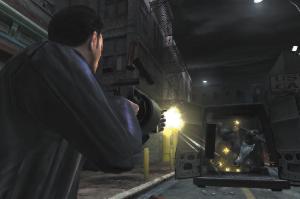 It seems that Lem is trying to turn the club into a respectable establishment,
but he's being held hostage in his own establishment by a bunch of
insane, gun-toting thugs. As Max entered through the back door, he
heard Lem finishing up a phone conversation with a mysterious woman
over the intercom, then demanded to know Lem's location. Over the
course of the next few areas, Lem shouted a few words of useless encouragement
as Max went berserk, tearing through his enemies with dual Ingram
MAC-10 submachine guns .
It seems that Lem is trying to turn the club into a respectable establishment,
but he's being held hostage in his own establishment by a bunch of
insane, gun-toting thugs. As Max entered through the back door, he
heard Lem finishing up a phone conversation with a mysterious woman
over the intercom, then demanded to know Lem's location. Over the
course of the next few areas, Lem shouted a few words of useless encouragement
as Max went berserk, tearing through his enemies with dual Ingram
MAC-10 submachine guns .
Since
the club is still under construction, it was full of scaffolds, piles
of lumber, and white sheets tossed over furniture, and the architecture
seemed to provide not only good cover, but also good opportunities
for Max to swing around corners or jump down from heights in bullet
time to blast his enemies. In this area, we got our first demonstration
of Max Payne 2's "bullet time 2.0," an improved version
of the ability, which turns Max's bullet time meter yellow and actually
lets him move at an almost normal speed, while his enemies are still
stuck in slow motion. According to a Rockstar representative, bullet
time 2.0 represents Max being "completely in the zone,"
and as such, it's available only rarely, and it can't be replenished
normally just by waiting, like standard bullet time. Between the different
architecture (which lets you duck for cover, then come out swinging),
different weapons, and different kinds of bullet time, Max Payne 2
should very likely provide hardcore fans plenty of opportunity to
stage their own dramatic, slow-motion fights as they play through
the game multiple times.
Over
the course of this mission, we also encountered Mike the Cowboy, a
nonchalant Russian Mafioso equipped with an AK-47, a thick Russian
accent, and a cowboy hat. Mike was introduced by a brief, movielike
title that appeared next to him onscreen in floating text before he
stood up and introduced himself. Even though Max fights most of his
battles alone in the sequel, he occasionally joins computer-controlled
characters like Mike on cooperative missions, though if Max doesn't
watch where he's shooting, he may turn Mike and his other buddies
against him.
Max
Payne 2: the Fall of Max Payne seems to be coming together well, and
publisher Rockstar has confirmed that the game is on schedule for
its projected release date of
October 15.
A
Gamespot preview
Slipknot
By He
Who Sleeps
Slipknot
is probably best known as "the middle of nowhere." Most
non-residents consider the corn-and-pig-state a geographical black
hole. Since rock n' roll's dawning in the early '50s, Slipknot has
had no singular voice to put on the musical map. Naming 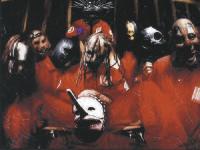 a
significant musical entity from the state is inarguably a fruitless
task; it simply can't be done. However, nine freaks from Des Moines,
draped in industrial coveralls, surrealistic self-made masks, and
an attack that combines violently regurgitated "L.A. neo-metal,"
death metal, hip-hop, and down-tuned screeching horror--are about
to leap upon the unsuspecting world like a musical of Clockwork Orange.
a
significant musical entity from the state is inarguably a fruitless
task; it simply can't be done. However, nine freaks from Des Moines,
draped in industrial coveralls, surrealistic self-made masks, and
an attack that combines violently regurgitated "L.A. neo-metal,"
death metal, hip-hop, and down-tuned screeching horror--are about
to leap upon the unsuspecting world like a musical of Clockwork Orange.
Have you ever
thought about what a messed-up hard-core metal band from "the
middle of nowhere" would sound like? "Ultra-violence"
only begins to describe it... Meet 0, 1, 2, 3, 4, 5, 6, 7, and 8.
(In human terms that's DJ Sid Wilson, drummer Joey Jordison, bassist
Paul Gray, percussionist Chris Fehn, guitarist Jim Root, sampler Craig
Jones, percussionist Shawn Crahan, guitarist Mick Thomson, and vocalist
Corey Taylor, respectively.) Each comes equipped with not only a frightening
visual persona and number assignment, but a talent on his particular
instrument that combines and collides to form the nine-headed savior/destroyer
of modern heavy music dubbed Slipknot.
Now, with the
tools and talents (not to mention complex-yet-infectiously-catchy
songs) that this band holds in its grasp, the world has no choice:
Slipknot has arrived, and you must now decide how to deal with it.
Formed during the latter half of 1995, the band went through necessary
lineup changes to arrive at what they now describe as "a family
unit." All native Iowans, their rather unassuming, un-happening
locale gave the members plenty of space and time to perfect their
unusual take on 'heaviosity'.
The band recorded and distributed the self-released debut Mate, Feed,
Kill, and Repeat in 1996, and the ball hasn't stopped rolling since.
Attracting the attention of a number of labels, Slipknot finally signed
to Roadrunner through noted producer Ross Robinson's I AM RECORDS
imprint in 1997 and entered Indigo Ranch Studios in Malibu with Robinson
to record their self-titled debut. 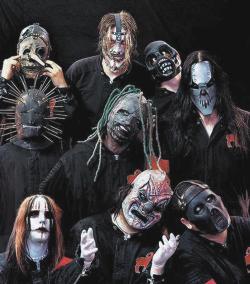
It's a gross understatement
of what actually transpires when it all comes together on stage. Until
you hear the sound they create, having nine members in the band might
seem ludicrous. Shawn claims it couldn't work any other way: "We've
maintained an excellent practice schedule for the last three years.
Everybody's on time, everybody's always there, and we always practice
as a unit. Our music is so reliant on each other that if one guy,
even the DJ, is gone, it's just wouldn't be our songs without him.
Without even one person, something is really, really missing. Everybody
has to be present. Even the littlest things make the songs magical."
Just as striking
visually as they are musically, Slipknot stresses that the visuals
do not take precedence over the music. "We never put on the s***
we wear to try and get people into us," says Joey Jordison. "We
did it because, after being degraded constantly for trying to play
music or do something in Des Moines, it just came to be like we were
an anonymous entity. No one gave a f***, no one cared, so we were
never about our names or our faces; we're just about music. So we
just put it on and it started getting people, and it just started
to turn into this big thing. The music's the most important, though.
The coveralls and masks happened, and for some reason it worked, therefore
we had to kind of continue with it. We got stuck with it."
Thanks
to a hefty Ross Robinson production job on "Slipknot", Slipknot's
vision, part one, has been successfully realized. Shawn feels that
Robinson was as highly motivated to work on the record as the band
was to work with him. "We're a highly, highly aggressive band,
and very seldom do we meet people who are in the realm of our aggressiveness
when we play as a unit, and Ross took us into the recording room and
was throwing punches at us. He was into it. Ross got up every day
and went and worked out so he could be in shape to do our album."
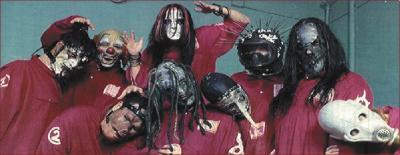
Slipknot
self-released a CD in 1996, "Mate, Feed, Kill, Repeat",
before signing with Ross Robinson's I Am Records, an imprint of Roadrunner.
Their label debut, "Slipknot", was released in 1999 with
their latest, "Iowa", following two years later.
Album
Review
The
Watson Brothers: Ohom
By
Hamdan Kabir
The concept of
side projects is yet to become popular in Bangladeshi music. We see
people pursuing solo careers apart from their bands. However, the
concept of artists from different bands coming together to form an
altogether new band is new. The Watson Brothers has introduced with
their album "Ohom".
The Watson Brothers
is basically a side project of people from Cryptic Fate and their
friends. (I had heard of it a year ago when I was taking an interview
of Cryptic Fate.) Shakib from Cryptic Fate is just the vocalist, whereas
guitarist Farhan plays the bass. The guitarist is Imran, who used
to play in a band called THE ATTEMPED BAND. The drummer is Arafat,
who is well known for having played with Cryptic Fate for quite some
time. They are not the only artists featured in the band. One song
in the album has been sung by Jon of Black while Tahsan (Black) has
played the keyboard for another song. Moreover, Elita has done some
additional harmonies.
The
good part about The Watson Brothers is that it is nothing close to
Cryptic Fate and unique in its own way. You'll find lots of different
influences in their music. Track 1 called "Akash" and track
3 called "Rong" are especially reminiscent of U2 with those
familiar guitar tones. Both songs are quite commercial but still worth
listening to. Track 2 is called "Chaya". The most romantic
song on the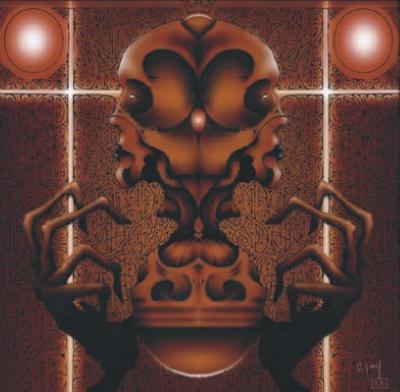 album, this
song has good lyrics and vocals and has some nice and fairly fast
keyboard solos by Tahsan. Track 4 is another pop rock number. This
one is called "Aamar notun aami" and has good lyrics. A
personal favourite is track 5, the title track "Ohom". The
song seems to be deeply influenced by Tool with striking bass tones
and dark lyrics and tunes. Track 7 is called "Jhor" and
can be termed as the only hard rock number in the album. It's quite
long too and crosses the 10-minute mark. The bass work is quite awesome
and Farhan really shows his talent here. The tune reminds you of Arabian
scales. Track 8 is another commercial number based on a groovy acoustic
rhythm. Track 9 is an instrumental number based on acoustic rhythms.
Track 10 seemed the best song to me. It's a blues rock number and
the longest on the record (over 11 minutes). The vocals have been
provided by Jon from Black, who has done some great work. The guitar
work is great too, with some strong lead solos that may remind you
of Carlos Santana. Imran turns out to be a delightful and compact
guitarist with a good deal of variety in his style.
album, this
song has good lyrics and vocals and has some nice and fairly fast
keyboard solos by Tahsan. Track 4 is another pop rock number. This
one is called "Aamar notun aami" and has good lyrics. A
personal favourite is track 5, the title track "Ohom". The
song seems to be deeply influenced by Tool with striking bass tones
and dark lyrics and tunes. Track 7 is called "Jhor" and
can be termed as the only hard rock number in the album. It's quite
long too and crosses the 10-minute mark. The bass work is quite awesome
and Farhan really shows his talent here. The tune reminds you of Arabian
scales. Track 8 is another commercial number based on a groovy acoustic
rhythm. Track 9 is an instrumental number based on acoustic rhythms.
Track 10 seemed the best song to me. It's a blues rock number and
the longest on the record (over 11 minutes). The vocals have been
provided by Jon from Black, who has done some great work. The guitar
work is great too, with some strong lead solos that may remind you
of Carlos Santana. Imran turns out to be a delightful and compact
guitarist with a good deal of variety in his style.
"Ohom"
is really great when it comes to sleeve design. This is the first
time in Bangladesh that a CD has had an inner sleeve bigger than four
pages. The sleeve of "Ohom" features lots of cool photos
and depicts how The Watson Brothers was formed.
Overall,
"Ohom" is a commercial album. In spite of that, it has some
great tunes and a good album with which to pass your time. The sound
mixing has been great too. Hardcore metal fans may not be pleased
with it. People who listen to all sorts of stuff will definitely enjoy
it. Moreover, the sleek and suave CD design makes it something that
you won't mind adding to your collection.
One More Galaxy
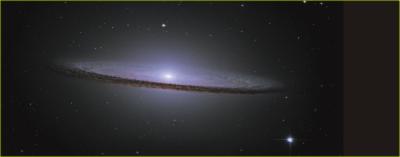
This NASA Hubble
Heritage Team image shows the Sombrero Galaxy. HHT astronomers, who
assemble many of the NASA Hubble Space Telescope's most stunning pictures
are celebrating their five-year anniversary with the release this
image. One of the largest Hubble mosaics ever assembled, this magnificent
galaxy is nearly one-fifth the diameter of the full moon. The team
used Hubble's Advanced Camera for Surveys to take six pictures of
the galaxy and then stitched them together to create the final composite
image. The photo reveals a myriad of stars in a pancake-shaped disk
as well as a glowing central bulge of stars.
